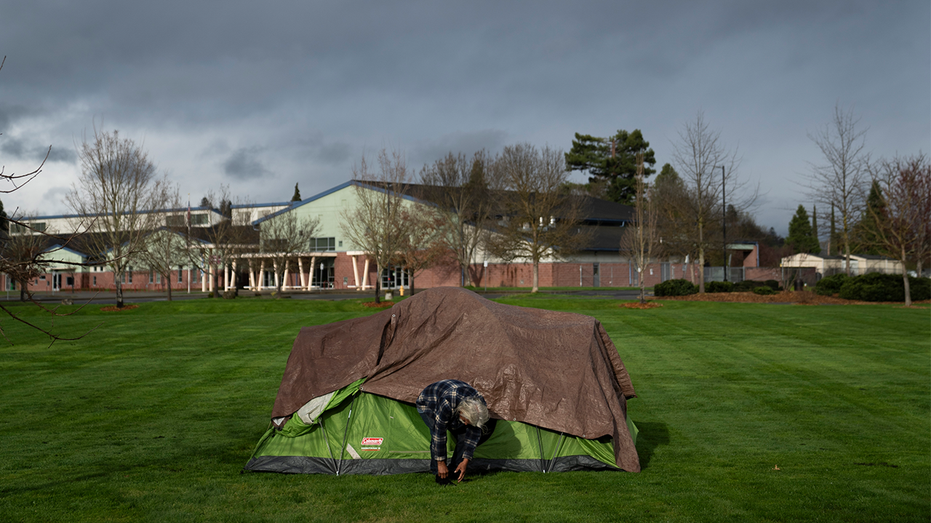An Oregon judge has issued a preliminary injunction blocking a city at the center of a U.S. Supreme Court ruling on homeless encampments from enforcing camping restrictions unless certain conditions are met.
Josephine County Circuit Court Judge Sarah McGlaughlin ruled Friday that the city of Grants Pass must increase capacity at locations the city approved for camping and ensure the sites are physically accessible to people with disabilities.
If the city fails to meet those conditions, the judge’s order prohibits the city from citing, arresting or fining people for camping on public property. It also prevents the city from forcing people to leave campsites, from removing campsites that are not clearly abandoned or from prohibiting camping in most city parks.
The city may still enforce rules banning sleeping on sidewalks and streets or in alleys and doorways.
Mayor Clint Scherf told The Associated Press he was “disheartened” by the judge’s order. The city’s information coordinator, Mike Zacchino, told the outlet that the city was “reviewing all aspects to ensure we make the best decision for our community.”
The lawsuit that ignited the case, filed by Disability Rights Oregon, argued that the city was discriminating against people with disabilities and violating a state law requiring cities’ camping regulations to be “objectively reasonable.” Five homeless people in Grants Pass were among the plaintiffs.
Grants Pass has struggled for years to handle the homelessness crisis and has become symbolic of the national debate over how to respond to the issue. Many of the city’s parks, in particular, saw encampments impacted by drug use and litter.
Fremont, California — another city seeking to deal with the homelessness crisis — passed one of the nation’s strictest anti-homeless encampment ordinances last month, banning camping on any public property and subjecting anyone “causing, permitting, aiding, abetting or concealing” encampments to either a $1,000 fine or up to six months in jail.
Last summer, the U.S. Supreme Court ruled in a case brought by the city that communities can ban sleeping outside and fine people who violate the ban, including when there are not enough shelter beds.
The Supreme Court ruling overturned an appeals court decision that camping bans enforced when shelter space is insufficient amounted to cruel and unusual punishment under the Eighth Amendment of the U.S. Constitution.
Following the high court ruling, Grants Pass banned camping on all city property except sites designated by the City Council, which established two locations for the hundreds of homeless people in an effort to remove them from the parks.
After taking office this year, the new mayor and new council members moved to close the larger of the two sites, which housed roughly 120 tents, the lawsuit said. The smaller site’s hours of operation were also reduced to between 5 p.m. and 7 a.m.
Both sites were often crowded, with poor conditions and inaccessible to people with disabilities because of loose gravel, according to the complaint.
“It is unconscionable to me to allow people to live there like that,” City Council member Indra Nicholas said before the vote to close the larger site.
CALIFORNIA CITY PASSES SWEEPING HOMELESS ENCAMPMENT BAN ON ALL PUBLIC PROPERTY
CLICK HERE TO GET THE FOX NEWS APP
After the lawsuit was filed, the city reopened a second, smaller site and extended the time people could remain at the location to four days.
McGlaughin’s order states that the city must increase capacity to what it was before the larger site was closed.
Tom Stenson, deputy legal director for Disability Rights Oregon, praised the ruling.
“This is not a radical solution. The court is basically saying, ‘Go back to the amount of space and places for people who are homeless that you had just three months ago,'” he told The Associated Press.
The Associated Press contributed to this report.
























